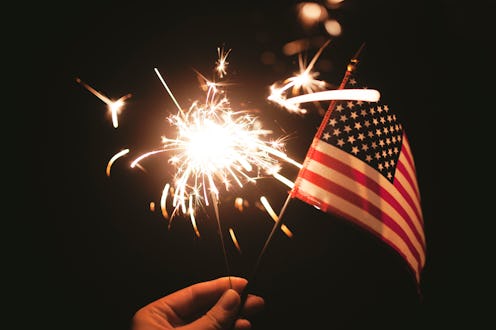If you want to expand your historical horizons, you can't go wrong with these 10 nonfiction books that will challenge what you know about the land of the free. The titles below will inspire you to look deeper into U.S. history and question everything you have been told about this country.
History is told by the victors, so we must explore the historical narratives of those who have been oppressed by familiar and beloved institutions in order to understand what really happened way back when. The United States has been the victor a lot — a fact we boast when we call ourselves "back-to-back World War champs" and "the protector of the world."
What that means, folks, is that Americans' view of American history is biased in favor of those who hold social, economic, and political power in this country: wealthy, white, able-bodied, cisgender, heterosexual, Christian men. That means that the poor, people of color, people with disabilities, LGBTQIA individuals, and members of religious minorities — or no religion at all — are often overlooked in our historical narratives, or are even made out to be the villains.
Check out my favorite nonfiction books that will challenge what you know about the land of the free below, and share your favorites with me on Twitter!
1'A People's History of the United States: 1492 - Present' by Howard Zinn
First published in 1980, Howard Zinn's A People's History of the United States looks at the story of the U.S. from a different perspective: that of the marginalized and oppressed communities who have often been impacted negatively by the march of American history.
2'A Disability History of the United States' by Kim E. Nielsen
Stretching from the time before Christopher Columbus to the present, Kim E. Nielsen's A Disability History of the United States explores how disability status has been determined historically, and how the disability label has been used to discriminate in immigration, housing, and health care.
3'Bury My Heart at Wounded Knee: An Indian History of the American West' by Dee Brown
Bury My Heart at Wounded Knee examines how America's "taming" of the Wild West had hugely detrimental effects on indigenous populations, whose lives and cultures were snuffed out by white occupiers.
4'At the Dark End of the Street: Black Women, Rape, and Resistance — A New History of the Civil Rights Movement from Rosa Parks to the Rise of Black Power' by Danielle L. McGuire
In 1944, a 24-year-old black woman was abducted by an armed gang of white rapists during her walk home from church. The local NAACP chapter sent out its best investigator to handle the case. Eleven years before she refused to give up her seat on a bus, Rosa Parks launched the Civil Rights Movement with her investigation of the case.
5'And the Band Played On: Politics, People, and the AIDS Epidemic' by Randy Shilts
In the 1980s, a so-called "gay cancer" popped up in communities of gay men located in New York City, San Francisco, and other areas with large gay populations. For nearly a decade, government officials declined to invest in research or preventive measures for the disease, simply because of its association with gay men and I.V. drug users. Randy Shilts' 1987 microhistory of the AIDS epidemic remains a must-read work of nonfiction today.
6'Saltwater Slavery: A Middle Passage from Africa to the American Diaspora' by Stephanie E. Smallwood
Using the ledgers of slavers from the Royal Africa Company, Stephanie E. Smallwood details the horrors and economics of the trans-Atlantic slave trade — from the politics of West Africa and Europe, through the middle passage, to the slave markets on the United States' east coast — in her 2007 book, Saltwater Slavery.
7'The Other Slavery: The Uncovered Story of Indian Enslavement in America' by Andrés Reséndez
Andrés Reséndez's celebrated 2016 book examines how cultural factors, capitalism, and the law conspired to create a system in which Native Americans could be enslaved, even in free territories, and abused without recourse.
8'The Making of Asian America: A History' by Erika Lee
In The Making of Asian America, Erika Lee covers the whole history of Asian communities in the United States, from the Chinese railroad workers who were subsequently denied U.S. citizenship, to the myriad immigrants and refugees brought into the country by conflict.
9'Occupied America: A History of Chicanos' by Rodolfo F. Acuña
One of more than 80 books that were part of a now-banned Mexican American Studies program in Arizona, Rodolfo F. Acuña's Occupied America traces the history of the Mexican-American experience in the United States.
10'Transgender History: The Roots of Today's Revolution' by Susan Stryker
Stretching from the mid-1900s to the present, Susan Stryker's Transgender History explores how cross-dressing and transitioning moved from the closet into the light, and how the movement continues to grow and become more inclusive today.
